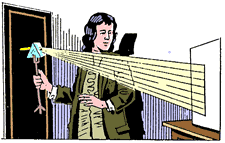
Dimdima
Online Children's Magazine from India

Dimdima
Online Children's Magazine from India
The story of apple and gravity
| Date of Birth-Death : 1642-1727 |
| Country of Birth :UK |
| Major Discoveries : -- |
|
Writing by the Scientist : Principia, Opticks |

Newton was a quiet boy. Having lost his father, even before he was born, he grew up with his grand parents. At 17,soon after he finished schooling, his mother decided that he would be trained to take on the family occupation of farming. Instead of watching sheep, young Isaac would spend his time making tiny gadgets. His schoolmaster saw the genius in him and persuaded his mother to send him to the University.
Newton set out for Cambridge in June 1661 triggering off his career in scientific research. Newton was constantly trying to understand and explain a wide variety of scientific phenomena. To test a question about colours, he would stare at the sun with one eye until all the colours changed. As a result he would have to shut himself up in the dark for several days before he could rid himself of the spots floating before his eyes. Newton was the first to prove that white light was made up of colours mixed together, and a prism could separate them. He did this by making a narrow beam of sun light pass through a prism kept in a darkened room, the light that emerged from the prism was split in to seven colours. He was the first person to understand the rainbow and explain its formation.
When plague broke out in Cambridge University in 1665, Newton had to go back home and had to stay there for almost two years, till the disease died out. The story goes that one day when he sat thinking in his garden, an apple fell on his head. It was then that Newton realized that the apple fell towards the Earth, and did not go anywhere else! All objects he noticed always fall towards Earth's center. He realized that like the Earth, every object in the universe attracts every other object towards it -- probably in proportion to its mass and inversely proportional to the distance between them, actually the square of the distance. Arguing like this, Newton formulated the Law of Universal Gravitation. (The apple might not have fallen on his head, at least there is no proof for that. But he must have seen apples falling down in his garden, triggering the thought process)
In 1686, nearly 20 years later, he presented his single greatest work, the Philosophiae Naturalis Principia Mathematica ('Mathematical Principles of Natural Philosophy'). In it, Newton explained the laws of motion, and the law of universal gravitation. The famous astronomer Edmund Halley, who thought highly of Newton paid for the publication of this invaluable contribution to science.
EXPLORE MORE...
Get Help or Give Help.
- Do you have a Science Question?
- Post it here and get the answer.
- Some questions posted by others are not yet answered.
- View those questions and answer them.
Dimdima is the Sanskrit word for ‘drumbeat’. In olden days, victory in battle was heralded by the beat of drums or any important news to be conveyed to the people used to be accompanied with drumbeats.
Bharatiya Vidya Bhavan
K. M Munshi Marg,
Chowpatty, Mumbai - 400 007
email : editor@dimdima.com
Bharatiya Vidya Bhavan
505, Sane Guruji Marg,
Tardeo, Mumbai - 400 034
email : promo@dimdima.com
Dimdima.com, the Children's Website of Bharatiya Vidya Bhavan launched in 2000 and came out with a Printed version of Dimdima Magazine in 2004. At present the Printed Version have more than 35,000 subscribers from India and Abroad.